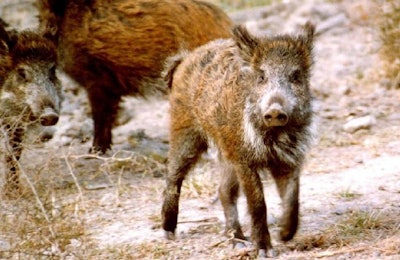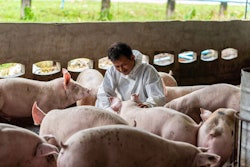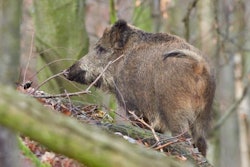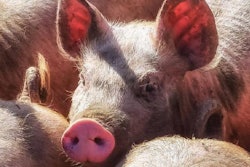
Among domestic pigs, the disease has struck 3 large farms in western Russia, and a commercial herd in Moldova and Romania, as well as several outbreaks in backyard herds.
At the end of last month, a wild boar found dead in the north of the Czech Republic tested positive for African swine fever (ASF) virus, according to the official notification to the World Organisation for Animal Health (WOAH). The carcass of a young animal was found in Liberec, a region in the north of the country that borders Germany and Poland.
It has been almost five years since the last of the previous cases in the country, according to the State Veterinary Service. It reports the wild boar was found near the border with Poland.
After the presence of the infection was detected, disease control measures were put in place over an area of approximately 200 square kilometers. Here, hunting was immediately banned, movements of wild animals will be constrained, and monitoring of the wild population will be stepped up. Visitors to the area must not leave marked paths.
Within the control zone, all domestic pigs must be registered with the authorities, and kept housed. Within 10 days, all hobby and backyard pig herds will have to be sent for slaughter.
Between June 2017 and April 2018, 230 outbreaks of ASF in wild boar in the Czech Republic were registered with the European Commission (EC) through its Animal Disease Information System. No cases in domestic pigs were reported in the country.
In February 2019, it was announced that ASF had successfully been eradicated from Czech Republic. Subsequently, European Union (EU) member states voted to lift all restrictions on the country. The European Commission adopted this decision shortly afterwards.
Overview of ASF situation in domestic pigs in Europe
Since January 1, the number of confirmed ASF outbreaks in domestic pigs in Europe has reached 512. This is according to the latest results from the EC’s disease system (as of December 5).
So far this year, 12 European states have officially registered one or more ASF outbreaks through this system. For comparison, 11 European states registered a total of 1,874 ASF outbreaks with the EC over the whole of 2021.
Registering by far the most outbreaks in 2022 has been Romania with 313. This includes an additional 27 outbreaks confirmed over the previous month. After Romania come Serbia — now with 102 outbreaks — and North Macedonia (29).
Also registering new cases in domestic swine with the EC over the past month have been Lithuania (now with 16 outbreaks so far in 2022), and Moldova (13).
The Republic of Moldova’s animal health agency has reported to WOAH the first ever cases of ASF in the western district of Nisporeni. Presence of the virus was confirmed after 17 pigs died out of a herd of 29,500 at a commercial farm at the end of last month. The rest of the herd has been destroyed to contain the spread of infection. This district borders Romania.
Meanwhile, in the north of the Republic, ASF has been detected again after a brief hiatus in the district of Floresti. Affected was a small backyard herd.
Among the 16 new outbreaks confirmed to WOAH by the veterinary authority of Romania over the past month was one at a commercial farm. At the end of November, ASF virus was detected after four pigs died out of 9,051 animals at the premises in the southeastern county of Ialomita. Other recorded outbreaks affected backyard herds across the country.
Europe’s wild boar total for year reaches 6,800
So far this year, 6,800 ASF outbreaks among wild boar have occurred in Europe, according to the latest update of the EC’s disease information system (as of December 5).
Including the latest case in the Czech Republic, 15 of the continent’s states have registered one or more cases of the disease in the wild population so far this year.
For comparison, 12 countries confirmed with the EC one or more ASF cases among the wild population — a total of 12,150 outbreaks — during the whole of 2021.
Among these wild animals, recording the most outbreaks with the EC in 2022 has been Poland (1,924), followed by Germany (1,553), Latvia (825), Hungary (528), Slovakia (509) and Romania (428). Further outbreaks were reported in all these countries since the previous update from this source (dated November 4). Also confirming new cases were Bulgaria, Estonia, Italy, Lithuania, North Macedonia and Serbia.
Since ASF was first detected in Germany in September 2020, 4,622 cases have been confirmed in wild boar, according to the national veterinary agency, the Friedrich-Loeffler Institute (as of December 2).
Meanwhile, Poland’s total outbreaks in its wild boar population has reached 1,807 for the year so far, reported the chief veterinary office (as of December 6).
ASF strikes 3 large farms in western Russia
Over the past four weeks, Russia’s veterinary authority has registered several ASF outbreaks in wild and domestic animals with WOAH. The EC does not include data on the disease situation in Russia.
Presence of the ASF virus was confirmed in the last week of November at two adjacent commercial units operated by Miratorg in the Oryol region. One of these had more than 62,000 pigs, and the other 59,000.
According to Miratorg, its specialists are engaged in eradicating ASF from its premises. Affected was a complex including fattening and breeding pigs, as well as a facility for artificial insemination. Quarantine and other disease control measures were put in place, and all animals on-site are to be slaughtered by December 14.
Oryol oblast is part of Russia’s Central federal district.
Meanwhile, in the Southern federal district, the ASF virus has been detected again after a two-year absence in Krasnodar krai. At a farm with around 20,600 pigs in this region, pigs tested positive for the virus after five of them died at the end of last month.
As well as these new outbreaks in domestic pigs, the veterinary authority has also reported additional cases of the disease in herds where the disease had previously been reported to WOAH. This applies to outbreaks in Ivanovo and Yaroslavl in the Central federal district, Samara (Volga district), Kaliningrad (Northwestern district) and Stavropol (North Caucasian district).
However, the authorities have declared to WOAH that the ASF situation has been “resolved” in two regions of the Central district — Kostromo and Moscow. In those regions, 21 and two outbreaks, respectively, had previously been confirmed.
Further ASF cases reported among Russia’s wild boar
Over the past month, 13 new ASF cases in wild boar have been registered with WOAH by Russia.
Of these, six were in the Chechen Republic. Last cases in this region of the North Caucasian federal district were detected in October 2009. Four were in Oryol oblast, two in Samara, and one in Ivanovo.
View our continuing coverage of the global African swine fever situation.
















